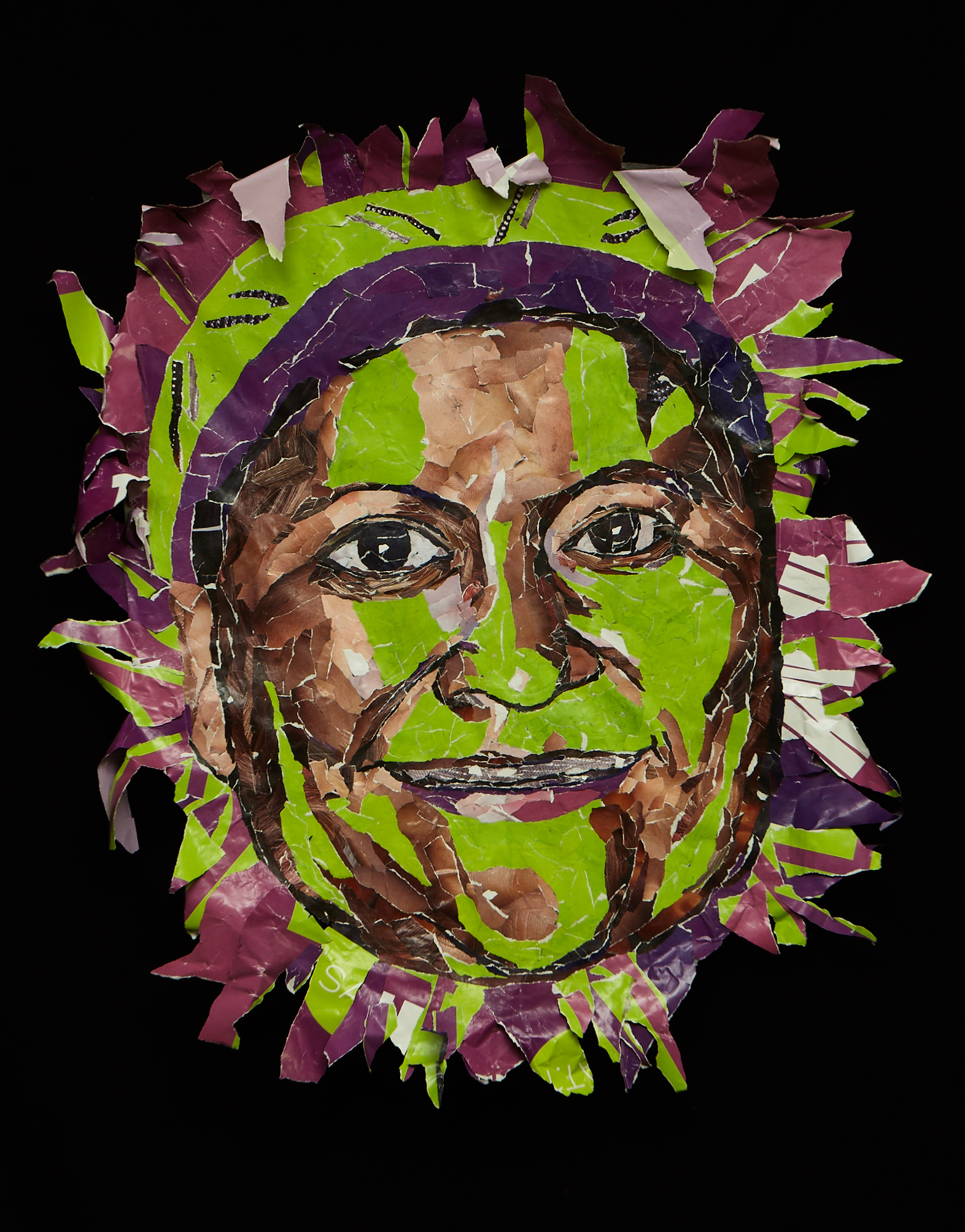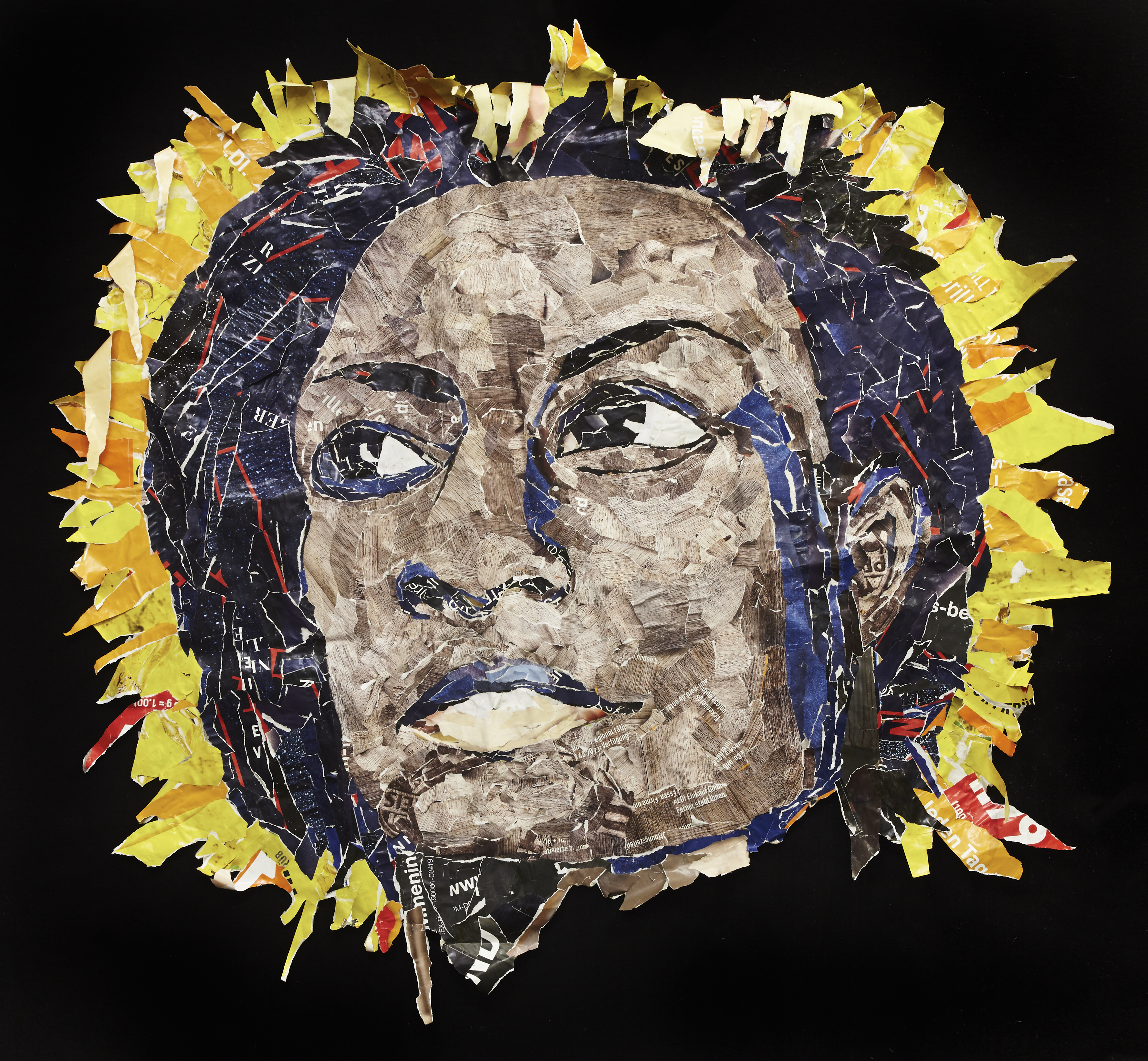Creation 2020
While most of the time women in the advertisement are depicted for their bodies and reduced to their appearance, the series of portraits “Real model instead of top models” aim to spread another picture of women and portray inspiring women who stood against armed violence and human rights violation with their ideas, talents and voices.
By using advertisements Claire aim to appropriate and deconstruct invading and toxic images and transform them into portraits of heroines of our contemporary world, which are often underrepresented or even ignored.
„Because there are plenty of amazing women from all the continents, which could give us empowering role models. Because sexism is still omnipresent in the pictures we are daily confronted with. Because we don’t need heroines of the cosmetics but heroines for a better society. Because we don’t need to shave our legs to be great.
Because we don’t need external validation about our physical appearance to be beautiful. Because emancipation is to sit where you want to sit, even you have to break some rules. Because women make history. Because the next generations need to know these wonderful women, who didn’t stop at the door of their house and improved our lifes.“

Anna
Advertisement, paper glue
150 cm * 100 cm
Anna Politkovskaya: 1958-2006
Anna Politkovskaya was a Russian writer, journalist, and human rights activist. She was known for her reporting on the Second Chechen War (1999-2005) and other political events in Russia.
Politkovskaya's national and international reputation developed from this reporting from Chechnya. Despite frequent acts of intimidation and violence she refused to stop reporting on the war for seven years. Arrested by the Russian military in Chechnya in 2001, Politkovskaya was detained, interrogated, beaten, and humiliated by Russian troops. She faced a mock execution using a BM-21 Grad multiple-launch rocket system and was then poisoned with a cup of tea that made her vomit.
In 2004 she was poisoned while flying from Moscow via Rostov-on-Don to help resolve the Beslan school hostage crisis, and had to turn back, requiring careful medical treatment in Moscow to restore her health.
In 2006, she was murdered in the elevator of her block of flats, this attracted international attention, but it was not until 2014 when five men were sentenced to prison for the murder. It is still not known who ordered or paid for the contract killing.
The articles written by Politkovskaya after 1999 about conditions in Chechnya were turned into several books. Her investigations and publications were mostly available to Russian readers through the Russian newspaper Novaya Gazeta known for its investigative, and often critical, coverage. Politkovskaya received many international awards for her work after 2000 and she published a book in 2004, a personal account of Russia entitled “Putin’s Russia” for western audiences.
In it she opens an essay titled “Am I Afraid?” with the words;
"People often tell me that I am a pessimist, that I don't believe in the strength of the Russian people, that I am obsessive in my opposition to Putin and see nothing beyond that"
And goes on to close the essay and book with;
"If anybody thinks they can take comfort from the 'optimistic' forecast, let them do so. It is certainly
the easier way, but it is the death sentence for our grandchildren. “

Rosa
Advertisement, paper glue
150 cm * 100 cm
Rosa Parks: 1912 – 2005
Rosa Parks was an American activist in the civil rights movement most recognised for her crucial role in the Montgomery bus boycott. She has often been called "the first lady of civil rights" and "the mother of the freedom movement".
On December 1, 1955, on a bus in Montgomery, Alabama, Parks refused to give up her seat in the “colored section” to a white passenger as ordered after the whites-only section was filled. Parks was not the first to defy bus segregation, but the National Association for the Advancement of Colored People (NAACP) thought she was most suited to go to court after being arrested for civil disobedience against segregation laws.
“People always say that I didn't give up my seat because I was tired, but that isn't true. I was not tired physically, or no more tired than I usually was at the end of a working day. I was not old, although some people have an image of me as being old then. I was forty-two. No, the only tired I was, was tired of giving in.”
Parks was a renowned figure in the community and her active decision to be controversially and civilly disobedient inspired the local black community and they boycotted Montgomery buses for over a year. This was the first major direct-action campaign of the post-war civil rights movement. She suffered for her act; fired from her job and received death threats for years.
The Montgomery bus boycott and Parks’ initial act of resistance became key symbols of the movement. Internationally, Parks became an icon of the fight against racial segregation and organized and collaborated with civil rights leaders, including Martin Luther King Jr. She moved to Detroit and was also active in the Black Power movement and the support of political prisoners.
Parks received national recognition, including the NAACP's 1979 Spingarn Medal, the Presidential Medal of Freedom and the Congressional Gold Medal. After Parks retired, she continued to insist that the struggle for justice was not over.

Rigoberta
Advertisement, paper glue
150 cm * 100 cm
Rigoberta Menchú: 1959-
Rigoberta Menchú Tum is a Guatemalan human rights activist and K‘iche‘ Indigenous feminist. Promoting the rights of Guatemala’s Indigenous peoples and Indigenous rights internationally has been her life’s work.
Menchú was born to a poor Indigenous family, one of many families who could not sustain themselves on the small pieces of land they were left with after the Spanish conquest of Guatemala. Her brother and mother were kidnapped, tortured and murdered by the Guatemalan army in 1979/80 and her father died in the 1980 Burning of the Spanish Embassy.
Menchú’s father was a prominent activist for the rights of Indigenous farmers in Guatemala and Menchú grew up active alongside him through the Committee for Peasant Unity. Despite gender discrimination from her desire to join the fight for justice she created a space for herself inspired by her mother.
Her early activism focused on defending her people from colonial exploitation. After leaving school, Menchú worked as an activist campaigning against human rights violations, particularly against Indigenous peoples and women, committed by the Guatemalan armed forces during the country‘s civil war between 1960 to 1996. Menchú was exiled in 1981 and escaped to Mexico where she continued to organize resistance to oppression in Guatemala and co-founded the United Republic of Guatemalan Opposition. After the Guatemalan Civil War ended, Menchú campaigned to have Guatemalan political and military establishment members tried in Spanish courts.
Menchú is a UNESCO Goodwill Ambassador and has received many prestigious awards, including the Nobel Peace Prize in 1992 and the Prince of Asturias Award in 1998. She is author of her autobiography “Crossing Borders” (1998) and subject of the testimonial biography “I, Rigoberta Menchú “ (1983). She ran for president of Guatemala in 2007 and 2011 and funded the country‘s first Indigenous political party, Winaq.
“I am like a drop of water on a rock. After drip, drip, dripping in the same place, I begin to leave a mark, and I leave my mark in many people‘s hearts.”

Toni
Advertisement, paper glue
150 cm * 200 cm
Toni Morrison: 1931-2019
Toni Morrison, was an American novelist, essayist, book editor, and college professor. She published her first novel “The Bluest Eye”, in 1970. She received national attention in 1977 with the critically acclaimed “Song of Solomon” (1977) which won her the National Book Critics Circle Award. Morrison went on to win the Pulitzer Prize for “Beloved” (1987) and the Nobel Prize in Literature in 1993.
The second of four children from a working-class, black family, Morrison‘s parents instilled in her a sense of heritage and language through telling traditional African-American folktales, ghost stories, and singing songs. Morrison also said they demonstrated to her how to keep your integrity and claim your own life in the face of acts of such „monumental crudeness.“
Morrison graduated in 1953 with a B.A. in English from Howard University and gained a master’s in American Literature from Cornell University in 1955. She was the first black female editor in fiction at Random House in New York City in the late 1960s. In this role, Morrison was vital in bringing Black literature to the mainstream. One of the first books she worked on was the groundbreaking “Contemporary African Literature” (1972). Also in this role she fostered a new generation of Afro-American writers.
In the 1970s and 1980s she developed her own reputation as an author and her most celebrated work “Beloved” was made into a film in 1998. When she was awarded the Nobel Prize in Literature in 1993 her citation read that she “in novels characterized by visionary force and poetic import, gives life to an essential aspect of American reality.” Morrison was the first black woman of any nationality to win the prize.
In her Nobel acceptance speech, Morrison talked about the power of storytelling. She told a story about a blind, old, black woman who is approached by a group of young people. They ask her, „Is there no context for our lives? No song, no literature, no poem full of vitamins, no history connected to experience that you can pass along to help us start strong? ... Think of our lives and tell us your particularized world. Make up a story.“
In 1996, she was granted the National Book Foundation’s Medal of Distinguished Contribution to American Letters and selected for the Jefferson Lecture, the U.S government’s highest honor for achievement in humanities. Morrison was presented with the Presidential Medal of Freedom by President Barack Obama in 2012.

Marielle
Advertisement, paper glue
150 cm * 200 cm
Marielle Franco: 1979-2018
Marielle Franco was a Brazilian politician, feminist, and human rights activist with a master‘s degree in public administration. Franco was a city councilor of the Municipal Chamber of Rio de Janeiro for the Socialism and Liberty Party (PSOL) from January 2017 until her death.
As a consultant for state representative Marcelo Freixo she coordinated the state legislature‘s Committee for the Defense of Human Rights and Citizenship and worked for many civil society organizations.
Franco identified herself as a representative and defender of poor black women and people from the favelas and ran for a seat on the Rio de Janeiro city council in 2016. With over 46,500 votes, Franco was one of the 51 representatives elected. As a city council member, Franco worked against gender violence, for reproductive rights, and for the rights of favela residents. She spoke out against the February 2018 federal intervention, with the deployment of the army in police operations, in Rio de Janeiro by Brazilian president Michel Temer.
In 2018, while delivering a speech in a car north of Rio de Janeiro, Franco and her driver were shot multiple times and killed from another vehicle. Franco had been an outspoken critic of police brutality and extrajudicial killings. Just the day before her murder Franco stated, “Another homicide of a young man that could be credited to the police. Matheus Melo was leaving church when he was killed. How many others will have to die for this war to end?“
In March 2019, two former police officers were arrested and charged with the murder of Marielle Franco.
Journalist Glenn Greenwald said of Franco:
“Her relentless and brave activism against the most lawless police battalions, her opposition to military intervention, and, most threateningly of all, her growing power as a black, gay woman from the favela seeking not to join Brazil’s power structure, but to subvert it.”